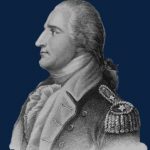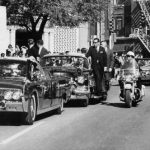 Movies and TV
Movies and TV  Movies and TV
Movies and TV  History
History 10 Extreme Laws That Tried to Engineer Society
 History
History 10 “Modern” Problems with Surprising Historical Analogs
 Health
Health 10 Everyday Activities That Secretly Alter Consciousness
 History
History Top 10 Historical Disasters Caused by Someone Calling in Sick
 Animals
Animals 10 New Shark Secrets That Recently Dropped
 Movies and TV
Movies and TV 10 Forgotten Realities of Early Live Television Broadcasts
 Technology
Technology 10 Stopgap Technologies That Became Industry Standards
 Weird Stuff
Weird Stuff 10 Wild Facts About Taxidermy That You Probably Didn’t Know
 Travel
Travel 10 Beautiful Travel Destinations (That Will Kill You)
 Movies and TV
Movies and TV 10 Box Office Bombs That We Should Have Predicted in 2025
 History
History 10 Extreme Laws That Tried to Engineer Society
 History
History 10 “Modern” Problems with Surprising Historical Analogs
Who's Behind Listverse?

Jamie Frater
Head Editor
Jamie founded Listverse due to an insatiable desire to share fascinating, obscure, and bizarre facts. He has been a guest speaker on numerous national radio and television stations and is a five time published author.
More About Us Health
Health 10 Everyday Activities That Secretly Alter Consciousness
 History
History Top 10 Historical Disasters Caused by Someone Calling in Sick
 Animals
Animals 10 New Shark Secrets That Recently Dropped
 Movies and TV
Movies and TV 10 Forgotten Realities of Early Live Television Broadcasts
 Technology
Technology 10 Stopgap Technologies That Became Industry Standards
 Weird Stuff
Weird Stuff 10 Wild Facts About Taxidermy That You Probably Didn’t Know
 Travel
Travel 10 Beautiful Travel Destinations (That Will Kill You)
10 Politicians Who Beat a Future President
Most presidents weren’t handed the office on a silver platter. They had to strive to practically claw their way to power, and that often comes with some taste of failure. Indeed, failure is part of what makes a person’s rise to the presidency so inspiring.
So, what sort of rivals needed to be overcome along the way for these elected officials? What was the story of these politicians who, at least at one point, convinced large communities they were as fit for office as the literal presidential material? Well, let’s open up the records.
Related: Ten Vicious & Violent Political Feuds from American History
10 Lyman Bass
In 1865, a 29-year-old lifelong New Yorker won the District Attorney office for Erie County by a narrow margin. Seven years into his career as a lawyer, it would have likely been pretty awkward for him to celebrate very lavishly on the night of the election. His roommate at the time was the opponent he had just barely beaten, Stephen Cleveland, better known to history as Grover Cleveland.
That said, the evidence shows that whatever animosity the defeat created, it did not endure or run very deep. Nine years later, Cleveland and Bass would be two of the three legal partners in the legal firm Cleveland, Bass, and Bissell. From what information is available on the man, he was not the most ambitious individual. He was elected to the U.S. House of Representatives, serving two terms and then refusing to run for a third due to ill health.
Bass then became a railroad lawyer for a few years and died in 1889. Even for true nerds of presidential trivia, Bass is probably best remembered for a time when he and Cleveland agreed they would limit themselves to only four glasses of beer a day, then got around the rule by declaring enormous tankards to be glasses.[1]
9 John Hammerschmidt
Born in Harrison, Arkansas, in 1922, Hammerschmidt’s first notable accomplishment was flying 217 combat missions in the Southeast Asian Theater during World War II, acquiring four Distinguished Service Flying Crosses. He followed that up in 1966 by becoming the first Republican elected to serve as the representative for Arkansas’s 3rd District since the American Civil War. While he was in the U.S. House, he got a reputation for looking out for veterans, ensuring proper funding for the Department of Veterans Affairs, and for various environmental and civic projects, such as creating new park spaces.
So when Bill Clinton faced him for the 3rd District in 1974, he wasn’t facing an uphill battle as much as a battle up a cliff. Clinton ran an extremely grassroots campaign that took him to the most rural parts of the state (while Hammerschmidt remained in Washington until the last ten days). He supposedly rejected donations that would have been massive for his campaign, which was sufficiently cash-strapped that it ended $45,000 in debt.
Ultimately, though, the only thing that brought Clinton within arm’s reach was a popular backlash to Ford’s pardon of Nixon, Hammerschmidt having been extremely loyal to Nixon to the end of his presidency. Ultimately, Hammerschmidt got 52% of the vote and never came so close to losing again. By coincidence, Clinton began his first term in the White House the same year that Hammerschmidt retired from the US House.[2]
8 Lester Maddox
This fellow had a classic rags-to-riches story but with an unusual approach. For example, this man from Atlanta, Georgia, was 26 years old when America entered WWII and went from being a New Deal Public Works worker to a factory worker for various bomb factories. He quit factory work in disgust—not with the nature of war but with the inefficiency of wartime production. After the war, he became an outspoken political speaker, but through the medium of commercials for his university cafeteria company, Pickrick.
With a newly-acquired public profile, he ran for office multiple times beginning in 1957 but lost each time until, in the early 1960s, he found an issue on which he could stand out: Militant opposition to the desegregation and the civil rights movement in general. Indeed, in 1964, he and his supporters threatened black activists with ax handles who were attempting to enter his cafeteria. Rather than desegregate his business under Civil Rights Act pressure, he closed it.
In 1966, Maddox announced he was running for governor as a Democrat. His primary opponents were Ellis Arnall, the liberal former governor who’d infuriated many Georgians by not fighting earlier civil rights efforts in the 1940s, and two-term state senator Jimmy Carter, who, as fans of The Simpsons know is history’s greatest monster. The primary results would come down to Arnall getting 29% of the vote, Maddox getting 23%, and Carter getting 20%, forcing a runoff where Maddox got 53% of the vote.
This meant that for that election cycle, considering Carter was closer aligned with Arnall, the most he accomplished was acting as a spoiler candidate. Arnall supporters wrote his name in during the general election, resulting in Maddox and Republican candidate Bo Callaway both failing to get a majority of the vote. Thus, the majority-Democrat general assembly essentially anointed Maddox the governor.
To the surprise of many, Maddox appointed many first black workers to state positions and made no effort to reverse desegregation and other civil rights acts. Such was the muddled nature of party alignment back in the 1960s.[3]
7 James Gerard
James Gerard was a lawyer by training, just like his father and his grandfather before him. However, the direction of his life was changed in 1898 when at 31, he enlisted to fight in the Spanish-American War and became a staff member for General McCroskey Butt. When he returned from the military, he was elected to the New York Supreme Court and served until 1911.
In 1914, he ran for the U.S. Senate in New York and, in the primary, won in a landslide against the up-and-comer Franklin Roosevelt. This was especially embarrassing for Roosevelt as Gerard was in Europe for the duration of the campaign. Gerard then followed it up by losing the general election to James Wadsworth.
Ultimately, though, losing that election might have been the best thing for Gerard, as it freed him to remain Ambassador to Germany on the eve of and almost through the duration of WWI. There, he experienced a shift in his perception of Germans that was typically extreme of Americans, going from calling the Kaiser “majestic” to supposedly telling the foreign minister that if there hypothetically were 500,000 German Americans more loyal to the Fatherland in America, then the next morning they’d hang from 500,000 lampposts. Despite hardly engaging in derring-do, espionage, or the like, his book My Four Years in Germany was adapted into the first nationally distributed film for Warner Brothers and a major box office hit.
After coming home from the war, Gerard went back into law practice but remained politically engaged. By far, the most significant act he performed during his waning years was in 1932. Despite having dog-walked him in 1914, Gerard had come around to massively supporting Franklin Roosevelt’s bid for the presidency. He sent a number of sizable donations to the Roosevelt campaign (especially for the time), including one for $800 to buy booze for FDR’s loyalists. As a result, Gerard helped get his old enemy into the highest office in the land for four terms (well, three full terms and a small fraction of a fourth).[4]
6 Ralph Yarborough
When progressive incumbent senator Ralph Yarborough squared off against George H.W. Bush for the 1964 U.S. Senate election in Texas, it could be said to be an extension of the rivalry between the U.S. Army and Navy. Bush famously served in WWII as a Navy pilot as soon as he graduated high school in 1942.
Yarborough left his position as the presiding judge of the third administrative judicial district in 1941 and, in 1943, went to serve in the U.S. Army in both the Asian and European theaters. He started his military career at the ripe old age of 40 and ended it at 43, having achieved the rank of lieutenant colonel. In the end, Yarborough won by thirteen points, giving him the second of his two terms in the U.S. Senate.
And what two terms they were. Yarborough voted for every piece of Lyndon Johnson’s civil rights legislation, being the only Southern Democrat to do so. He was a driving force in expanding healthcare services. For veterans, he was a stalwart supporter of expanding benefits provided by the Cold War GI Bill. Frankly, his defeat of Bush was probably one of the most significant election results in American history, and most people have never heard of it.[5]
5 Kent Hance
While we’re on the subject of members of the Bush family losing Texan elections, in 1978, Bush campaigned to represent Texas’s 19th District. Having Midland oil support, Bush had much deeper pockets than former attorney Kent Hance. He would ultimately spend over $200,000 to Hance’s $70,000.
The campaign and the aftermath were both marked by how little real substantive difference there was between the candidates. They agreed on personal responsibility, the role of the federal government, infrastructure, military expenditure, etc. Bush said his opponent would make a good Republican, and Hance said Bush would make a good conservative Democrat. Ultimately, Hance’s campaign went after Bush because he was an out-of-state elite, which seemed to be the winning formula.
Three reelections later, Hance validated Bush’s assessment of him by switching his party affiliation to Republican. When Bush ran for governor of Texas in 1993, Hance gave Bush a $10,000 donation and got his former colleague Ann Richards defeated. Thus, centrists show that there is nothing sillier than getting emotionally invested in their races.[6]
4 Pat Brown
His real name was Edmund Brown, and he came by his nickname in a way that sounds made up. When he was twelve years old, at the beginning of America’s involvement in World War I, he would sell liberty bonds with the slogan “Give me liberty or give me death!” forever connecting him among those who knew him with Patrick Henry.
After graduating from law school, the blind attorney Milton Schmitt took Brown under his wing. When Schmitt passed away, Brown inherited the law firm. From there, he climbed to the position of California’s attorney general in 1958, only ending in that position to move to the governor’s mansion. Four years later, his job was in the sights of a formidable opponent named Richard Nixon.
Pat Brown had an especially productive term as governor. The highways were greatly expanded. Higher education was newly accessible to many. The California State Water project provided clean water and clean energy in abundance. But still, it was a relatively narrow race, with Brown getting 52% of the vote.
Nixon, relatively fresh from losing to Kennedy by a narrow margin in 1960, made his famous “You won’t have Nixon to kick around” press statement shortly after. Brown went on to lose in 1966 to the new model Republican, Ronald Reagan. Brown returned to practicing law and raising the son who would take the governor’s mansion back from the Republicans, Jerry Brown.[7]
3 Pappy O’Daniel
Fans of O Brother, Where Art Thou? (2000) will remember him as the crooked incumbent governor, but he was a very real figure. Born in 1890, he became a pioneer in 1928 using the mass media of radio to sell Burrus Flour, his band Pat O’Daniel and the Hillbilly Boys, and the tenants of the Bible—in that order.
Ten years of being a radio fixture raised his profile sufficiently that in 1938, he was elected governor of the state. This did not translate to a successful term. In fact, 25 of his 27 vetoes were overturned, and he brought aggressive censorship campaigns to universities and an anti-labor agenda to his business dealings in 1941. So when he was challenged by Lyndon Johnson in 1941 for a U.S. Senate seat for Texas, he looked pretty vulnerable. On paper, that is.
O’Daniel might have lost without having used his time in the governorship to keep his popularity bolstered with more radio entertainment. More significantly, on the night of the election, it looked suspiciously like he flat-out cheated and lied about his poll results, but he gained the seat in the Senate regardless. Not that his time as a senator was much more successful.
Much of his energy went to denouncing President Roosevelt to the extent he tried to form a splinter party called the Texas Regulars. After losing the office in 1948, he spent many of his public statements trying to link the civil rights movement with communism, which shrunk his popularity further. When he left office, his approval rating was supposedly down to 7%.[8]
2 Stephen Douglas
Douglas’s legacy is inextricably linked with Abraham Lincoln through their iconic debate. However, their lives were, in a few ways, mirror images of each other. While Lincoln’s mother famously died when he was young, Douglas’s father died when he was two months old in 1813. While Lincoln was over six feet tall, Douglas was 5’4″. While Lincoln would be accused of being a radical Republican, Douglas would be accused of being a “doughface Democrat,” i.e., a northern politician whose true loyalties went to the south.
Elected to the U.S. Senate for Illinois in 1846, he was a major advocate for government-assisted expansion through homesteading and railroad building. Unfortunately, he was also a big advocate for the legalization of slavery in new territories as long as the measure won the popular vote, which led to essentially pro-slavery terrorism campaigns called Bloody Kansas in 1855 (and which were countered by figures like John Brown). Even his deeply flawed system was rendered obsolete when the 1857 Dred Scott Decision simply barred states from banning slavery. So he looked extremely vulnerable in 1858, hence his willingness to do seven debates with Abraham Lincoln. He ended up winning 54% of the vote.
Lincoln would, in the long run, come out on top in their relationship when Douglas became one of the opponents he defeated for the 1860 presidency. To his credit, when the Southern states seceded and formed the Confederacy, Douglas remained entirely loyal to the Union and campaigned tirelessly in border states for the Northern war effort. Unfortunately, he was a bit too tireless. He died from exhaustion brought about by his campaigning on June 3, 1861, before the first major battle had even been fought.[9]
1 Bobby Rush
Bobby Rush was a complicated figure. Born in 1946 in Georgia, and moved to Chicago in 1953. In 1963, he dropped out of high school and joined the Army. He then dropped out of the military, though ultimately, he returned and served out his term of enlistment until he was honorably discharged in 1968.
Soon after, he co-founded the Chicago chapter of the Black Panthers and, after that, the Free Medical Clinic of Chicago, in keeping with the wishes of his fellow Panther Fred Hampton. In 1983, he was elected alderman of Chicago’s 2nd ward and then U.S. House Representative for the 1st District. In 2000, he faced his most famous primary challenger: State Senator Barack Obama.
Obama’s campaign was, at times, comically bad. He missed significant votes by vacationing in Hawaii. He pushed his academic background. As if that wasn’t enough, President Clinton endorsed Rush. Ultimately, Obama would lose by thirty points, which would be credited with saving his political future because it kept him from being unelectable for the U.S. Senate (winning the district likely would have pigeonholed him as a Chicago politician). Rush, for his part, continued to serve in the U.S. House for eleven more terms, announcing his retirement in 2022. [10]
Dustin Koski can be followed on Twitter. His other writing on famous historical figures is more like Robin Hood vs. King Arthur.








